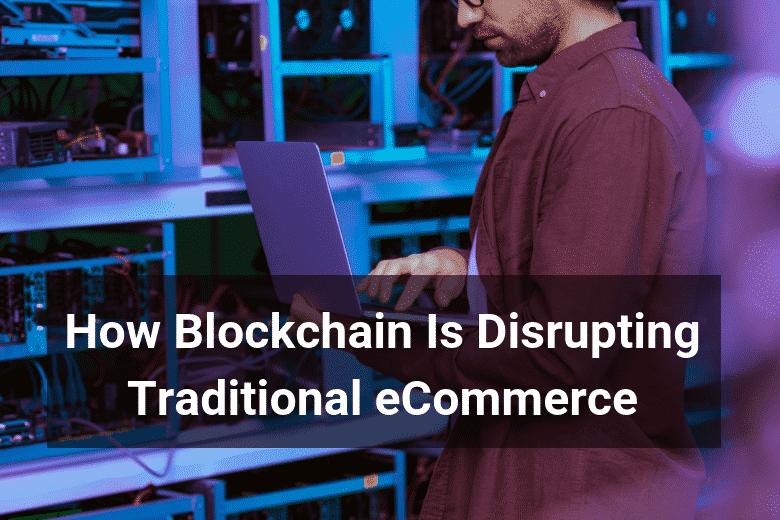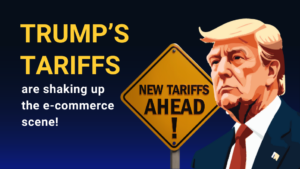While people who have invested in cryptocurrencies have doubts whether cryptocurrencies are going to replace traditional money or not, nobody has doubts about the potential of blockchain and its importance. Companies from completely different industries are implementing blockchain-based solutions and see how this technology disrupts any industry it touches. According to the data of CB Insights, there are more than 40 industries that are changing because of blockchain. Thus, it’s time for everyone to agree that the disruptive potential of this technology goes far beyond the finance sector.
eCommerce is a relatively new industry, however, it was directly related to computer technology from the very beginning, so there’s no surprise it quickly evolves and absorbs the latest innovations. It’s a huge industry. According to statistics, the total turnover of B2C eCommerce in Europe grew by as much as €100 billion from 2017 to 2018, reaching €602 billion and doubling the figures of 2013. What can blockchain do for such a successful industry? The truth is, blockchain can make it even better, changing eCommerce as we know it forever.
What does ‘traditional eCommerce’ mean at all?
The most interesting thing is that eCommerce is not so different from traditional commerce, in fact, the only big difference is increased accessibility. Many eCommerce stores are open 24/7, and you can make purchases there regardless of where you live, with no need to leave your house. Therefore, eCommerce companies have more customers. In addition, opening your own eCommerce business is cheaper than opening a real store made of bricks and mortar. Thus, more people try themselves in online business and build stores after they succeed on the internet.
As you can see, eCommerce offers many benefits for both businessmen and consumers. Does this industry need any changes, or moreover, disruptions, at all? The industry itself is indeed beneficial for everyone, however, it is also associated with some challenges. For example, the modern eCommerce market is to a large extent monopolized by a few big players, like Amazon, eBay, and Alibaba. Such companies have almost no competitors and they are not interested in any changes. On the other hand, there are many historical examples of disruptive trends emerging in monopolized industries.
Main eCommerce trends in 2018
-
Better integration of machine learning and AI
As machine learning is conquering more and more industries, its influence on eCommerce is expected to get stronger. AI and machine learning allow companies to provide accurate product recommendations and to improve search algorithms. Thanks to the ability to analyze massive amounts of data, AI can offer customers exactly what they are looking for
-
Voice search
Everyone is using mobile phones and tablets, and it’s hard to mention these devices without mentioning voice search as well. In addition, people own smart devices like Google Home or Amazon Echo. More and more people are using these devices to make purchases and, therefore, influence the politics of big companies. For example, people who make purchases using Amazon Echo are the most loyal customers of the platform and spend 66% more money than average Amazon users.
-
Better logistics and fast shipping
Amazon is not only one of the biggest but also one of the most innovative eCommerce companies. Amazon Prime’s shipping made many headlines, with people receiving their items within 8 minutes. Obviously, the whole industry is expected to move in the same direction, trying to meet these new standards.
The eCommerce industry evolves all the time so we can expect new innovative technologies to change the way we buy things online. Perhaps, the most important and the most discussed technology is blockchain, and it’s already here, offering new opportunities for buyers and sellers. Let’s take a closer look at what blockchain has to offer.
How blockchain is disrupting traditional eCommerce
First, blockchain offers decentralization, which means the end of monopoly. The existing big players don’t face any challenges and are not interested in any changes. However, every time a monopoly emerges in some industry, people create a new technology that disrupts this industry forever. Let’s just recall what happened to Nokia after Apple introduced its iPhone. Blockchain is capable of doing the same to companies like Amazon because it allows people to sell and buy items with no need for any centralized institution.
Ethereum introduced a system of smart contracts, which automatically ensures that any conditions two parties agreed upon are met. As soon as you get a certain item or service, the seller receives your payment. The security of the blockchain technology allows people to forget about any frauds because data recorded in a blockchain cannot be changed or deleted and remains there forever. Peer-to-peer connections make users the main players. In addition, automatic secure payments allow people to make deals with no middlemen involved.
Centralized platforms charge fees because it’s their main source of revenue. Depending on a particular platform, sellers have to pay 10-50% of their sale price in fees. Thus, consumers get higher prices and retailers get less profit. Blockchain eliminates fees, however, it’s not the only advantage of this technology for retailers and consumers.
Platforms like Amazon don’t allow buyers to communicate with sellers directly, which results in bad relationship management and a lack of feedback. Blockchain allows consumers to leave reviews that can be easily checked for authenticity. With the use of blockchain, competitors will be no longer able to undermine a seller’s reputation with fake negative feedback, while buyers will check legitimate reviews and make informed decisions.
If a company wants to succeed, it should consider implementing loyalty programs. Many companies have their own systems of bonuses. Buyers have to register in multiple programs, which takes time and effort. Thus, many customers don’t participate at all. The automatic mechanism of transactions used in blockchain allows sellers to track all customers’ interactions and evaluate their loyalty status. Blockchain also eliminates the possibility of loyalty fraud. In addition, businesses can cooperate and create reward programs where customers can spend their earned cryptocurrency tokens as they want, without being limited to one company only.
Conclusion
eCommerce entrepreneurs have to deal with many challenges, and blockchain can simplify their life by enabling them to deal with their customers directly. Blockchain not only helps people make secure payments but it also enables companies to get verified reviews and to put their loyalty programs to the next level. Imagine eCommerce where sellers don’t have to pay any fees, and buyers can be sure that the chosen seller is trusted. Imagine eCommerce without monopolists and middlemen, where businesses and customers get closer to each other than ever before. This is what makes blockchain a disruptive technology, and this is a reason why a global crypto marketplace is just a question of time.
Author
Berta Melder is a brand manager, creative writer and enthusiastic blogger. Currently associated with Masterra as a content marketing strategist. She cooperates with different education courses covering a broad range of digital topics as a guest lecturer. Follow her on Twitter.

Ready To Upgrade Your Logistic Solution?
Speak to Floship ecommerce logistic consultant about improving your global support chain today





